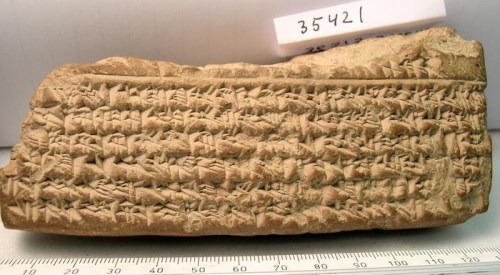Who Was Berossus?
“This volume is devoted to a man whose work is largely lost, whose life is shrouded in mystery, and whose real name we do not know.
(‘Berossos’ is a Greek rendering of an Akkadian name. Our best guess at the moment is that his fellow Babylonians would have known him as Bēl-rē ‘ûšunu (‘Bel is their shepherd’), but this is not certain; see further De Breucker’s contribution to this volume.)
What we do know is that ‘Berossos’ of Babylon was a contemporary of Alexander the Great and the first two Seleucid kings, Seleucus I and Antiochus I, and that he wrote a work about Babylonian history and culture, the Babyloniaca.
He describes himself as a Babylonian and a priest of Bel-Marduk, the national god of Babylon, though in practice this may mean no more than that he was in some way attached to the main temple of Babylon, the Esagila.
According to Vitruvius, Berossos later moved to the Greek island of Cos to open a school of astronomy.
Pliny mentions a statue which the Athenians set up to celebrate his powers of prophecy; and Pausanias makes him the father of the Sibyl. With Pausanias we are plainly in the realm of mythmaking.
Whether Vitruvius or Pliny are any more trustworthy has been debated. Whatever we make of their testimonies, it is not implausible that Berossos had connections with the astronomers of the Esagila while in Babylon, and he must certainly have had some connection with, or at least an interest in, the Seleucid court, because he dedicated his Babyloniaca to Antiochus I.

BCHP 12:
Seleucus III Chronicle (BM 35421 obv.)
(British Museum).**
https://www.google.co.th/imgres?imgurl=http%3A%2F%2Fwww.livius.org%2Fa%2F1%2Fmesopotamia%2FBCHP_seleucus_iii_obv.jpg&imgrefurl=http%3A%2F%2Fwww.livius.org%2Fcg-cm%2Fchronicles%2Fbchp-seleucus_iii%2Fseleucus_iii_01.html&docid=aLxHuKS411dd6M&tbnid=cit1JdGy3hkJpM&w=700&h=385&ei=jGdsVa7hM9O6uATukoLgAg&ved=0CAQQxiAwAg&iact=c
We know from a cuneiform chronicle that Babylonian religious experts acted as advisors to Antiochus I.
(R. J. van der Spek, Chronicle concerning Antiochus and the Sin temple: preliminary edition and translation, 1997.
A similar encounter is reported by Diodorus Siculus, 17.112: when Alexander returned to Babylon from India, an astronomer of the Esagila temple called Belephantes (Akkadian Bēl-apla-iddin?), advised Alexander not to enter the city.)
Excerpt from Diodorus follows.
“17.112.1: After the conclusion of his war with the Cossaeans, Alexander set his army in motion and marched towards Babylon in easy stages, interrupting the march frequently and resting the army.
17.112.2: While he was still three hundred furlongs from the city, the scholars called Chaldaeans, who have gained a great reputation in astrology and are accustomed to predict future events by a method based on age-long observations, chose from their number the eldest and most experienced.
By the configuration of the stars they had learned of the coming death of the king in Babylon, and they instructed their representatives to report to the king the danger which threatened. They told their envoys also to urge upon the king that he must under no circumstances make his entry into the city;
17.112.3: that he could escape the danger if he re-erected the tomb of Belus which had been demolished by the Persians, but he must abandon his intended route and pass the city by.
The leader of the Chaldaean envoys, whose name was Belephantes, was not bold enough to address the king directly but secured a private audience with Nearchus, one of Alexander’s Friends, and told him everything in detail, requesting him to make it known to the king.
17.112.4: When Alexander, accordingly, learned from Nearchus about the Chaldaeans’ prophecy, he was alarmed and more and more disturbed, the more he reflected upon the ability and high reputation of these people.
After some hesitation, he sent most of his Friends into Babylon, but altered his own route so as to avoid the city and set up his headquarters in a camp at a distance of two hundred furlongs.
This act caused general astonishment and many of the Greeks came to see him, notably among the philosophers Anaxarchus.
17.112.5: When they discovered the reason for his action, they plied him with arguments drawn from philosophy and changed him to the degree that he came to despise all prophetic arts, and especially that which was held in high regard by the Chaldaeans.
It was as if the king had been wounded in his soul and then healed by the words of the philosophers, so that he now entered Babylon with his army.
17.112.6: As on the previous occasion, the population received the troops hospitably, and all turned their attention to relaxation and pleasure, since everything necessary was available in profusion.
These were the events of this year.”
Berossos may well have been one of them, or in any case have worked in a similar milieu.”
Johannes Haubold, “The World of Berossos: Introduction,” from Johannes Haubold, Giovanni B. Lanfranchi, Robert Rollinger, John Steele (eds.), The World of Berossos, Proceedings of the 4th International Colloquium on the Ancient Near East Between Classical and Ancient Oriental Traditions, Harrassowitz Verlag, Wiesbaden, 2013, p. 3.
